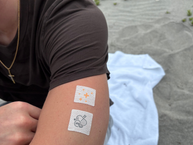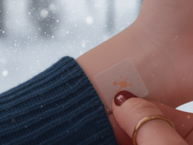Where did that bruise come from? You don’t know what happened or why it’s there? Maybe your mystery bruise is a sign that you have a vitamin or mineral deficiency. In that case, appropriate Vitamin Patches from PatchAid can contain the essential nutrients you need to maintain normal stores of vitamins and minerals.*
Mystery bruises are bruises that pop up without you knowing why. A bruise is a sign of bleeding due to blood vessels rupturing beneath the skin. We think of bruises as appearing after a noticeable event, like bumping into something or falling. But sometimes they appear seemingly out of nowhere.
Mystery bruising can be related to vitamin and mineral deficiencies, but there can be other causes, too. If you have any signs of mystery bruises, it’s best to talk to your healthcare provider about possible reasons, including getting tested for suspected nutrient deficiencies and discussing the use of Vitamin Patches from PatchAid to address them.
These are some possible reasons why you might bruise easily. It could be due to nutrient deficiencies. Or it could be the result of other factors, including some potentially serious ones. Here is some information on mystery bruises and possible deficiencies.
Iron Deficiency and Mystery Bruises
Iron deficiency is the most common mineral deficiency in the world. Is it contributing to your easy bruising? It’s possible, if you have an iron deficiency together with a vitamin C deficiency. Sufficient iron is necessary for you to have healthy red blood cells to deliver adequate amounts of oxygen to the cells in your body. Iron-deficiency anemia can lead to fatigue and increased infections.
Beef, liver, egg yolks, chicken, and cheese are animal-based sources of iron. Leafy green vegetables, potatoes, and beans are plant-based sources.
These are some groups at higher risk for iron deficiency.
- Women of child-bearing age
- Adolescents who are growing rapidly
- People eating strict plant-based diets
- Weight loss surgery patients
- People with malabsorptive disorders
If you have an iron deficiency, it’s difficult to overcome it with diet alone. Instead, an iron supplement can be necessary. Ask your doctor for an iron level test to make sure of your iron status. Then ask about an Iron Patch.*
The Iron Plus Patch by PatchAid contains 50 milligrams of iron. It also has vitamin C, which is linked to improved iron absorption, as well as vitamin A and folate. Vitamin A is another nutrient that is needed for a healthy immune system, and folate is needed for healthy red blood cells. With an iron patch, you don’t have to worry about an upset stomach or constipation that is common with oral iron supplements.
Vitamin C Deficiency and Mystery Bruises
Vitamin C is needed for collagen formation. Collagen or cartilage is in healthy joints, skin, and ears, for example. You also need vitamin C for healing, such as when a blood vessel is ruptured. Without adequate vitamin C, your body doesn’t have what it needs to prevent bruises or heal them quickly.
Food sources of vitamin C include strawberries and other berries, oranges and other citrus fruits, bell peppers, potatoes, cantaloupe, mangos, kiwis, broccoli, spinach and other leafy greens, onions, and tomatoes.
The Vitamin C Plus Patch by PatchAid has 2,500 mg of vitamin C. It also has other antioxidants, such as in a citrus bioflavonoid complex, rutin, and rose hips.
Vitamins D and K and Mystery Bruises
Are your wounds taking forever to heal? Then you may be looking at a symptom of vitamin D deficiency. Vitamin D may support healing processes, such as forming new healthy skin after you get a wound.
You’re at higher risk for low vitamin D levels if you:
- Have darker skin.
- Are an older adult.
- Wear protective clothing and sunscreen when you go outdoors.
- Live in a northern or mid-latitude climate.
There are a few food sources of vitamin D, but not a lot. Fatty fish, egg yolks, and fortified milk are some of them.
Vitamin K was first discovered for its role in blood clotting, so it may not be surprising that it may be related to bruising. Without enough vitamin K, the walls of your blood vessels may be weaker, and bleeding may occur more easily. The result may be increased bruising. Vitamin K is in foods such as leafy green vegetables.
Vitamin D3/Calcium Patch by PatchAid with vitamin K has 5300 IU of vitamin D3, which is the active form of vitamin D in the body. It also has 290 micrograms of vitamin K2 in the form of menaquinone, which is considered one of the best forms of vitamin K for supplements. It comes with magnesium and calcium as well.
Multivitamin Patch for Mystery Bruises
Are you low in a lot of vitamins and minerals? Are you following a restricted diet, such as a very low-carb diet or a post-op bariatric surgery diet? Do you have a malabsorptive disorder or have other risk factors for nutrient deficiencies?
Multivitamin and mineral supplements can act like an insurance policy against deficiencies. The Multivitamin Plus Patch by PatchAid contains 27 essential vitamins and minerals, including iron, zinc, and vitamins K, C, and D, which can all lead to more bruising if you’re deficient. The patch also has B vitamins, calcium, vitamin E, and many more minerals. That means you have a source for all of those nutrients every single day, even if you don’t happen to get enough of them in your diet each day to satisfy your needs.
Other Reasons for Mystery Bruises
There are many other possible reasons why you might be bruising more easily. These are a few of them.
- Aging. Your skin becomes thinner and less elastic.
- Medications. Blood thinners and some steroids can increase bruising.
- Genetics. Some people are prone to more bruising.
- Intense exercise.
- Liver disease, diabetes, or another chronic condition.
Mystery bruises can be a little inconvenient or even scary, but you can think of them as a message from your body. Once you figure out what is causing them, you can try to address the issue. If your bruises are related to a nutrient deficiency, a PatchAid Patch can help.* Be sure to talk to your provider before using any vitamin patches and whenever you have concerns about your health, since bruising can be a sign of a more serious problem.
*The Food and Drug Administration has not evaluated these statements. PatchAid patches are not intended to diagnose, treat, cure or prevent any disease. Anyone with a medical condition should seek the advice of a licensed medical practitioner. Individual results may vary.







